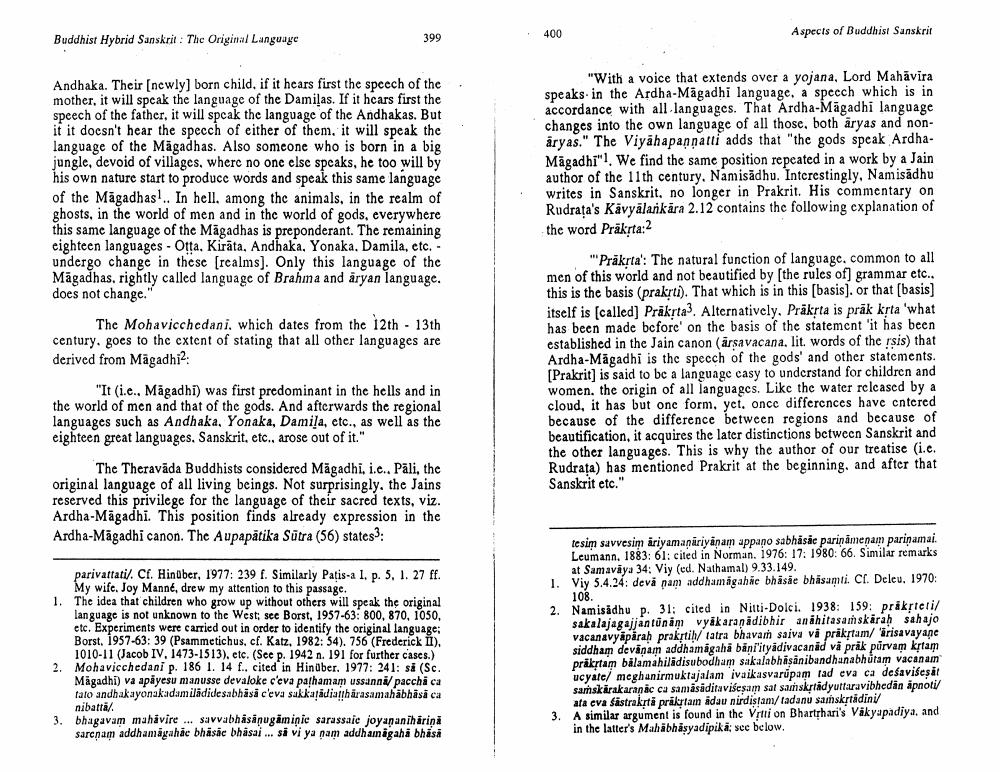________________
Buddhist Hybrid Sanskrit: The Original Language
399
400
Aspects of Buddhist Sanskrit
"With a voice that extends over a yojana, Lord Mahavira speaks in the Ardha-Māgadhi language, a speech which is in accordance with all languages. That Ardha-Magadhi language changes into the own language of all those, both aryas and nonåryas." The Viyahapannatti adds that "the gods speak ArdhaMàgadhi"!. We find the same position repeated in a work by a Jain author of the 11th century. Namisādhu. Interestingly, Namisādhu writes in Sanskrit, no longer in Prakrit. His commentary on Rudrata's Kavyalankara 2.12 contains the following explanation of the word Präkrta:2
Andhaka. Their newly] born child, if it hears first the speech of the mother, it will speak the language of the Damilas. If it hcars first the speech of the father, it will speak the language of the Andhakas. But it it doesn't hear the specch of either of them, it will speak the language of the Magadhas. Also someone who is born in a big jungle, devoid of villages, where no one else spcaks, he too will by his own nature start to produce words and speak this same language of the Magadhas!. In hell, among the animals, in the realm of ghosts, in the world of men and in the world of gods, everywhere this same language of the Māgadhas is preponderant. The remaining eighteen languages - Otta. Kiráta, Andhaka. Yonaka. Damila, etc.. undergo change in these [rcalms). Only this language of the Māgadhas, rightly called language of Brahma and aryan language. does not change."
The Mohavicchedani, which dates from the 12th - 13th century, goes to the extent of stating that all other languages are derived from Māgadhi2
"It (ie.. Mágadhi) was first predominant in the hells and in the world of men and that of the gods. And afterwards the regional languages such as Andhaka, Yonaka, Damila, etc., as well as the eighteen great languages. Sanskrit, etc., arose out of it."
The Theravada Buddhists considered Magadhi, i.e.. Pāli, the original language of all living beings. Not surprisingly, the Jains reserved this privilege for the language of their sacred texts, viz. Ardha-Magadhi. This position finds already expression in the Ardha-Magadhi canon. The Aupapatika Sutra (56) states:
"Prakrta': The natural function of language, common to all men of this world and not beautified by the rules of grammar etc.. this is the basis (prakrti). That which is in this (basis). or that (basis) itself is (called) Prakrta?. Alternatively, Prakrta is prāk krta 'what has been made before on the basis of the statement 'it has been established in the Jain canon (ārsavacana. lit. words of the rsis) that Ardha-Magadhi is the specch of the gods and other statements. (Prakrit) is said to be a language casy to understand for children and women, the origin of all languages. Like the water released by a cloud, it has but one form, yet, oncc differences have entered because of the difference between regions and because of beautification, it acquires the later distinctions between Sanskrit and the other languages. This is why the author of our treatise (i.c. Rudrata) has mentioned Prakrit at the beginning, and after that Sanskrit etc."
parivattati. Cf. Hinuber, 1977: 239. Similarly Patis-a I. p. 5. I. 27 ff.
My wife, Joy Manné, drew my attention to this passage. 1. The idea that children who grow up without others will speak the original
language is not unknown to the West; sec Borst, 1957-63: 800, 870, 1050, etc. Experiments were carried out in order to identify the original language: Borst. 1957-63: 39 (Psammetichus, cf. Katz, 1982: 54). 756 (Frederick it).
1010-11 (Jacob IV, 1473-1513), etc. (See p. 1942 n. 191 for further cases.) 2. Mohavicchedani p. 186 1. 14 f.. cited in Hinüber. 1977: 241: si (Sc.
Magadhi) va apāyesu manusse devaloke c'eva pahamam ussanni pacchi ca tato andhakayonakadamilādidesabhasi ceva sukkaadiartharasamahabhisica
nibatta/ 3. bhagavam mahavire ... savvabhåsinugaminie sarassaic loyananiharina
sarenam addhamagahác bhasac bhasai... si vi ya nam aduhainigahi bhasa
Iesim suvvesim ariyamanariyanam appuno sabhasac parināmenamparinamai. Leumann. 1883: 61: cited in Norman. 1976: 17: 1980: 66. Similar remarks
at Samaviya 34: Viy (ed. Nathamal) 9.33.149. 1. Viy 5.4.24: deva nam addhamagahîc bhåske bhásamti. Cr. Deleu. 1970:
108. 2. Namisådhu p. 31; cited in Nitti-Dolci. 1938: 159: priksteri/
sakalajagajjantunam vyakaranidibhir anahitasamskirah sahajo vacanavyäparah prakti/ tatra bhavan saiva vi prikstam/ 'irisavayane siddham devanam addhamagaha báni'ityadivacanid vi prik parvam krtam prikrtam balamahilidisubodhum sakalabhäşanibandhanabhūtam vacanam ucyate/ meghanirmuktajalam ivaikasvarūpam tad eva ca desavisesat samskärakaranac cu samasiditavisesam sat samskytadyutlaravibhedan åpnoti/
ata cva Sastrakta praktam idau nirdistam/tadanu sainsktadini 3. A similar argument is found in the Vihti on Bharthari's Vikyapadiya, and
in the latter's Mahābhasyadipika; see below.




